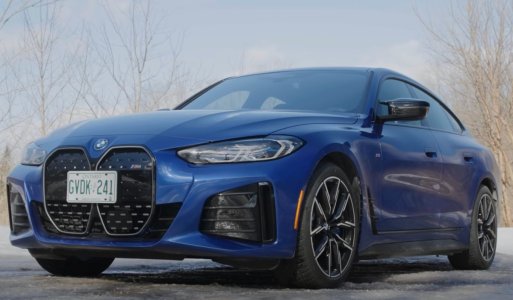New recall alert could affect your vehicle—here’s what drivers need to know
By
Veronica E.
- Replies 0
If you drive a BMW—it may be time for a quick safety check.
The company has issued a new recall affecting over 70,000 vehicles in the US due to a software-related issue.
At the center of the concern is a glitch that could cause sudden power loss while driving.
While there have been no reported injuries or accidents, the potential risk has prompted federal regulators to take action.
Here’s what’s happening, which vehicles are involved, and how to find out if your car is included.

The National Highway Traffic Safety Administration (NHTSA) explains that the recall involves a glitch in the software managing BMW’s high-voltage electric drive system.
In affected cars, the electric motor software might suddenly shut down—cutting off power to the vehicle while in motion.
This means the car could unexpectedly stop accelerating, which poses a crash risk, especially in traffic or on highways.
It’s not a mechanical defect, but rather a problem with the software that can be corrected with an update.
The recall covers several of BMW’s most advanced electric vehicles.
If you own one of the following, your car may be affected:
These models represent the future of BMW’s electric lineup—so if you’ve recently made the switch to an EV, be sure to check your vehicle’s status.
Fortunately, the fix is simple.
BMW is offering a free software update to resolve the issue.
Many vehicles will receive this update automatically over the air, similar to how smartphones update their software.
If your car doesn’t support over-the-air updates, your BMW dealer can install the update manually—again, at no cost to you.

Here are the steps to take if you think your vehicle might be part of the recall:
As vehicles become more high-tech and software-driven, recalls related to computer glitches and programming bugs are becoming more common.
Automakers and regulators are now quicker to act when a problem is found—even before accidents happen.
While it may feel inconvenient, these actions are designed to keep drivers safe, and in this case, the fix is fast and free.
Even if your BMW seems to be running fine, it’s important to take this recall seriously.
Software issues can surface unexpectedly, and drive power is a crucial system.
Staying proactive helps protect you, your passengers, and others on the road.
Driving an electric BMW should be a smooth, high-performance experience—but safety always comes first.
A quick update today can help prevent problems tomorrow.
So whether you’re behind the wheel of an i4, iX, or i7, make sure your software is up to date and enjoy the road with peace of mind.
Read next: Tech fail at the drive-thru? This self-driving car caused a 30-minute traffic jam

If you’ve received a recall notice from BMW or have experience with over-the-air updates, feel free to share your story. Your experience might help others understand what to expect or take quicker action.
The company has issued a new recall affecting over 70,000 vehicles in the US due to a software-related issue.
At the center of the concern is a glitch that could cause sudden power loss while driving.
While there have been no reported injuries or accidents, the potential risk has prompted federal regulators to take action.
Here’s what’s happening, which vehicles are involved, and how to find out if your car is included.

Federal safety officials have issued a recall affecting over 70,000 BMW vehicles due to a risk of sudden power loss while driving. Image Source: Pexels / Sindre Fs.
What’s the issue?
The National Highway Traffic Safety Administration (NHTSA) explains that the recall involves a glitch in the software managing BMW’s high-voltage electric drive system.
In affected cars, the electric motor software might suddenly shut down—cutting off power to the vehicle while in motion.
This means the car could unexpectedly stop accelerating, which poses a crash risk, especially in traffic or on highways.
It’s not a mechanical defect, but rather a problem with the software that can be corrected with an update.
Also read: How the real price of your next car could be hiding in plain sight
Which BMW models are included?
The recall covers several of BMW’s most advanced electric vehicles.
If you own one of the following, your car may be affected:
- 2022–2024 BMW i4
- 2025 BMW i4 eDrive35
- 2025 BMW i4 eDrive40
- 2022–2024 BMW iX
- 2023–2024 BMW i7
- 2024 BMW i5
These models represent the future of BMW’s electric lineup—so if you’ve recently made the switch to an EV, be sure to check your vehicle’s status.
Also read: Is a car still worth it in retirement? Cities where it pays off
What is BMW doing to fix it?
Fortunately, the fix is simple.
BMW is offering a free software update to resolve the issue.
Many vehicles will receive this update automatically over the air, similar to how smartphones update their software.
If your car doesn’t support over-the-air updates, your BMW dealer can install the update manually—again, at no cost to you.

A look at the 2022–2024 BMW i4, one of the electric models included in the recent safety recall. Image Source: YouTube / Throttle House.
Also read: Swarming insects cause highway havoc as car flips—officials issue warning
What should you do now?
Here are the steps to take if you think your vehicle might be part of the recall:
- Watch for mail: BMW will send official recall notices to affected owners by August 5.
- Check your VIN: Visit nhtsa.gov/recalls and enter your Vehicle Identification Number (VIN) to see if your car is included.
- Call BMW directly: For help, contact BMW customer service at 1-800-525-7417. Be sure to mention Recall No. 25V395.
- Schedule service if needed: If your car doesn’t automatically receive the update, arrange a quick visit with your BMW dealer to complete it.
Also read: Ditch the car, keep the comfort: Why families are loving this car-free community
Why are recalls like this happening more often?
As vehicles become more high-tech and software-driven, recalls related to computer glitches and programming bugs are becoming more common.
Automakers and regulators are now quicker to act when a problem is found—even before accidents happen.
While it may feel inconvenient, these actions are designed to keep drivers safe, and in this case, the fix is fast and free.
Also read: The car everyone warned you about is coming back—Would you drive America’s most infamous vehicle?
Don’t ignore recall notices
Even if your BMW seems to be running fine, it’s important to take this recall seriously.
Software issues can surface unexpectedly, and drive power is a crucial system.
Staying proactive helps protect you, your passengers, and others on the road.
Driving an electric BMW should be a smooth, high-performance experience—but safety always comes first.
A quick update today can help prevent problems tomorrow.
So whether you’re behind the wheel of an i4, iX, or i7, make sure your software is up to date and enjoy the road with peace of mind.
Read next: Tech fail at the drive-thru? This self-driving car caused a 30-minute traffic jam
Key Takeaways
- BMW has recalled over 70,000 electric vehicles in the US due to a software issue that can cause sudden loss of drive power.
- Affected models include the 2022–2024 i4, 2025 i4 eDrive35 and eDrive40, 2022–2024 iX, 2023–2024 i7, and 2024 i5.
- BMW will provide a free software update to fix the issue, either over the air or at a dealership.
- Owners will receive notification letters by August 5 and can check their vehicle status using their VIN at nhtsa.gov/recalls.
If you’ve received a recall notice from BMW or have experience with over-the-air updates, feel free to share your story. Your experience might help others understand what to expect or take quicker action.






